新人教版七年级英语上Unit6
- 格式:pptx
- 大小:6.82 MB
- 文档页数:87
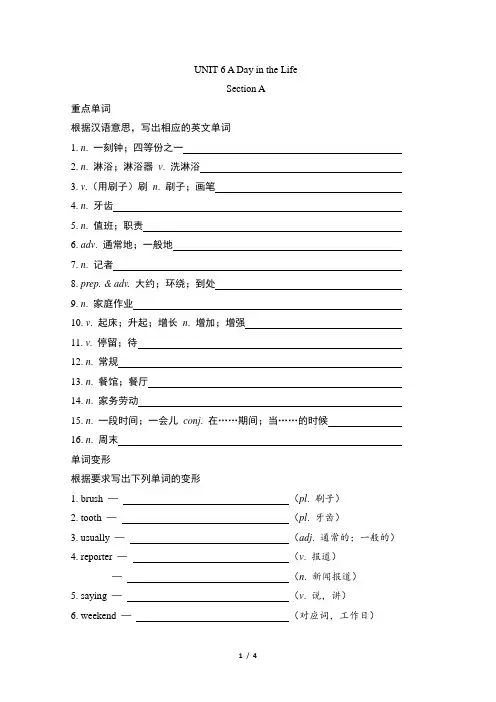
UNIT 6 A Day in the LifeSection A重点单词根据汉语意思,写出相应的英文单词1. n. 一刻钟;四等份之一2. n. 淋浴;淋浴器v. 洗淋浴3. v.(用刷子)刷n. 刷子;画笔4. n. 牙齿5. n. 值班;职责6. adv. 通常地;一般地7. n. 记者8. prep. & adv.大约;环绕;到处9. n. 家庭作业10. v. 起床;升起;增长n. 增加;增强11. v. 停留;待12. n. 常规13. n. 餐馆;餐厅14. n. 家务劳动15. n. 一段时间;一会儿conj. 在……期间;当……的时候16. n. 周末单词变形根据要求写出下列单词的变形1. brush —(pl. 刷子)2. tooth —(pl. 牙齿)3. usually —(adj. 通常的;一般的)4. reporter —(v. 报道)—(n. 新闻报道)5. saying —(v. 说,讲)6. weekend —(对应词,工作日)重点短语根据汉语意思,写出相应的英文短语1. 使用……;利用……2. 淋浴3. 穿衣服4. 刷牙5. 值班6. 起床;站起7. 做作业8. 上床睡觉重点句型根据汉语意思完成句子或对话1. ——你什么时候洗淋浴?——我通常在晚上洗淋浴。
—__________ do you __________ __________ __________?—I usually __________ __________ __________ at night.2. 嗯,你知道有句谚语叫做“早睡早起”!Well, you know the saying, “__________ __________ __________, __________ __________ __________!”3. 汤姆在学校待多长时间?__________ __________ does Tom stay at school?4. ——你晚饭后做什么?——我有时候读书或做作业。
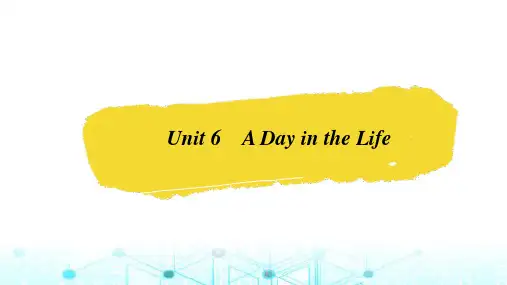
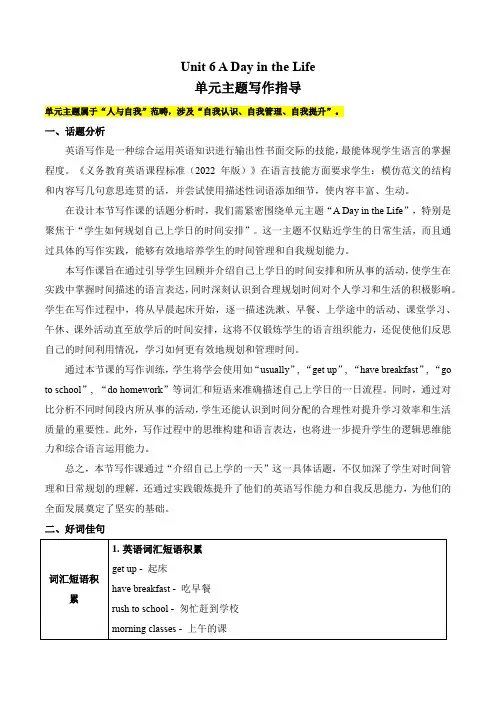
Unit 6 A Day in the Life单元主题写作指导单元主题属于“人与自我”范畴,涉及“自我认识、自我管理、自我提升”。
一、话题分析英语写作是一种综合运用英语知识进行输出性书面交际的技能,最能体现学生语言的掌握程度。
《义务教育英语课程标准(2022年版)》在语言技能方面要求学生:模仿范文的结构和内容写几句意思连贯的话,并尝试使用描述性词语添加细节,使内容丰富、生动。
在设计本节写作课的话题分析时,我们需紧密围绕单元主题“A Day in the Life”,特别是聚焦于“学生如何规划自己上学日的时间安排”。
这一主题不仅贴近学生的日常生活,而且通过具体的写作实践,能够有效地培养学生的时间管理和自我规划能力。
本写作课旨在通过引导学生回顾并介绍自己上学日的时间安排和所从事的活动,使学生在实践中掌握时间描述的语言表达,同时深刻认识到合理规划时间对个人学习和生活的积极影响。
学生在写作过程中,将从早晨起床开始,逐一描述洗漱、早餐、上学途中的活动、课堂学习、午休、课外活动直至放学后的时间安排,这将不仅锻炼学生的语言组织能力,还促使他们反思自己的时间利用情况,学习如何更有效地规划和管理时间。
通过本节课的写作训练,学生将学会使用如“usually”, “get up”, “have breakfast”, “go to school”, “do homework”等词汇和短语来准确描述自己上学日的一日流程。
同时,通过对比分析不同时间段内所从事的活动,学生还能认识到时间分配的合理性对提升学习效率和生活质量的重要性。
此外,写作过程中的思维构建和语言表达,也将进一步提升学生的逻辑思维能力和综合语言运用能力。
总之,本节写作课通过“介绍自己上学的一天”这一具体话题,不仅加深了学生对时间管理和日常规划的理解,还通过实践锻炼提升了他们的英语写作能力和自我反思能力,为他们的全面发展奠定了坚实的基础。
二、好词佳句三、写作框架四、写作范例根据下面的图片提示,描写Mrs. Smith一天的活动。
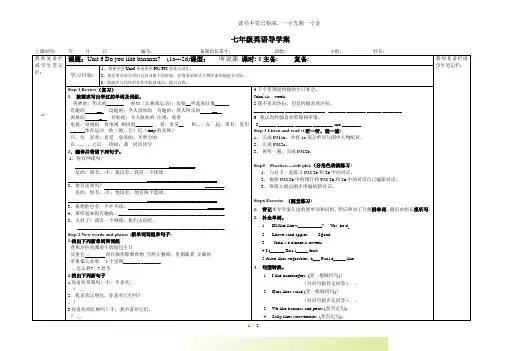
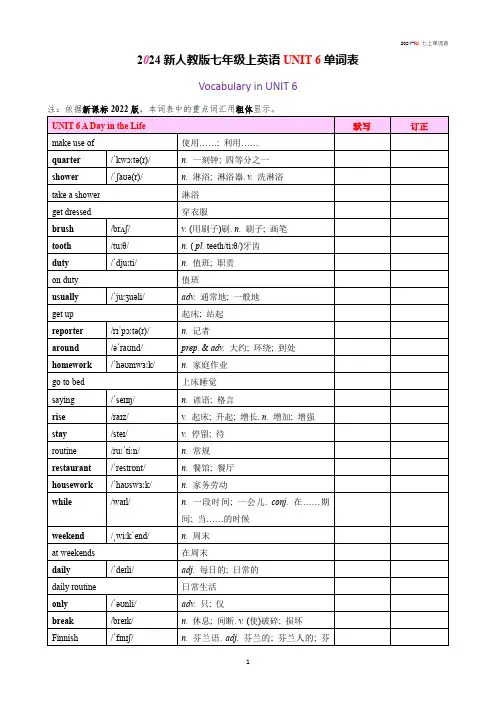
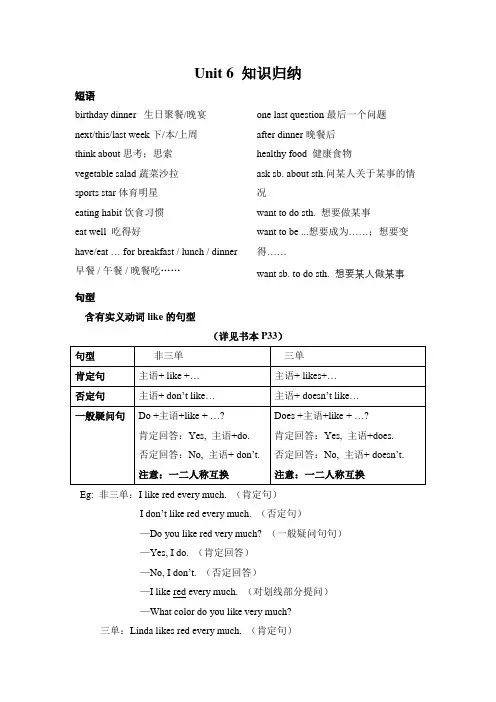
Unit 6 知识归纳短语birthday dinner 生日聚餐/晚宴next/this/last week 下/本/上周think about 思考;思索vegetable salad 蔬菜沙拉sports star 体育明星eating habit 饮食习惯eat well 吃得好have/eat … for breakfast / lunch / dinner 早餐 / 午餐 / 晚餐吃……one last question 最后一个问题after dinner 晚餐后healthy food 健康食物ask sb. about sth.问某人关于某事的情况want to do sth. 想要做某事want to be ...想要成为……;想要变得……want sb. to do sth. 想要某人做某事句型含有实义动词like的句型(详见书本P33)Eg: 非三单:I like red every much. (肯定句)I don’t like red every much. (否定句)—Do you like red very much? (一般疑问句句)—Yes, I do. (肯定回答)—No, I don’t. (否定回答)—I like red every much. (对划线部分提问)—What color do you like very much?三单:Linda likes red every much. (肯定句)Linda doesn’t like red every much. (否定句)—Does Linda like red very much? (一般疑问句句)—Yes, she does. (肯定回答)—No, she doesn’t. (否定回答)—Linda likes red every much.(对划线部分提问)—What color does Linda like very much?语法知识:名词可数名词:分为单数名词和复数名词(1)是可以计数的名词。
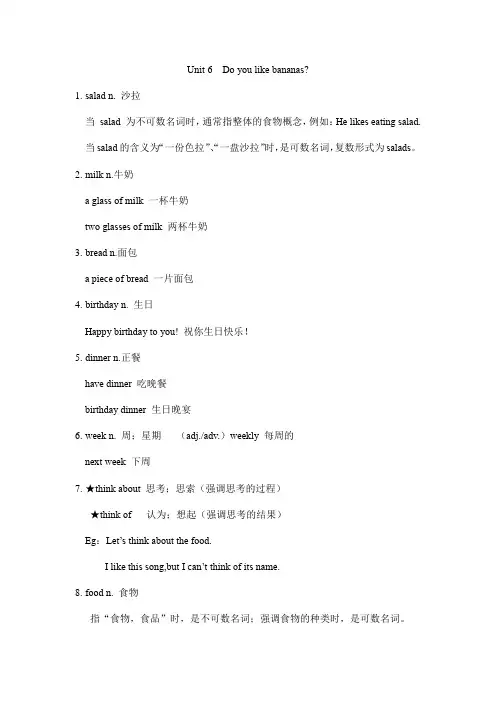
Unit 6 Do you like bananas?1.salad n. 沙拉当salad 为不可数名词时,通常指整体的食物概念,例如:He likes eating salad.“一盘沙拉”时,是可数名词,复数形式为salads。
当salad的含义为“一份色拉”、k n.牛奶a glass of milk 一杯牛奶two glasses of milk 两杯牛奶3.bread n.面包a piece of bread 一片面包4.birthday n. 生日Happy birthday to you! 祝你生日快乐!5.dinner n.正餐have dinner 吃晚餐birthday dinner 生日晚宴6.week n. 周;星期(adj./adv.)weekly 每周的next week 下周7.★think about 思考;思索(强调思考的过程)★think of 认为;想起(强调思考的结果)Eg:Let’s think about the food.I like this song,but I can’t think of its name.8.food n. 食物指“食物,食品”时,是不可数名词;强调食物的种类时,是可数名词。
9.right adj. 正确的;—(反义词)wrong 错误的adj. 右边的;—(反义词)left 左边的★All right!用作对方建议或劝告的应答语。
Eg:—Let’s go and ask him.让我们去问他。
—All right. 好的。
10.star n. 星星;明星a volleyball star 一个排球明星11.eat v. 吃★eating habits 饮食习惯12.well adv. 好;令人满意地(adj.)good 好的Eg:Sports Star Eats Well.I have good eating habits.13.question n. 问题one last qusetion 最后一个问题14.healthy adj. 健康的(n.)health 健康★keep healthy 保持健康15.want v. 想要want sth. 想要某物want to do sth. 想要做某事want sb. to do sth. 想要某人做某事Eg:I don’t want to be fat.16.—What do you like for breakfast?—I like ........【语法】名词的单复数有些名词既可作可数名词又可作不可数名词,但意义不同,要注意区分.①glass cn.杯子un.玻璃orange cn橘子un.橘汁①还有表示动物类的名词,表示动物时是可数名词,表示为菜肴时是不可数名词. chicken cn.小鸡un.鸡肉fish cn鱼un鱼肉①salad, icecream, food, fruit 作总称讲是不可数名词,作种类讲是可数名词【即学即练】一、请写出下列词的复数形式city _____ _zoo ______country _____ tooth ____mouse _________ boy____________ broom ___________car ____tree ______horse ______ bus______________ fox _____branch ____ baby _____ family _____ dish _____radio _____ photo _____ piano _____ knife _____leaf _____ life _____ thief _____ _man _____woman _____ child ___ foot______this _____________ watch___________ diary____________ day____________ book____________dress____________ sheep___________ tea_____________ box___________ strawberry_________ peach__________ sandwich__________ paper_________ juice__________ water____________ milk___________ rice__________people ______CD________ ox___________deer____________ fish___________二、选择填空.( )1. They e from different ______A. countryB. countriesC. a countryD. countrys( )2. How many ______ do you see in the picture?A. tomatosB. tomatoesC. tomatoD. the tomato( )3. They are______.A . woman teachers B. women teachersC. women teacherD. woman teacher( )4. Would you like _______ ,please?A. two glass of waterB. two glasses of waterC. two glass of watersD. two glasses of waters( )5. Most of ______ live in _______.A. Germans, GermanB. German, GermenC. Germen, GermanyD. Germans, Germany( )6. There are some ______ in these _______.A. knifes pencilboxesB. knives pencilsboxC. knives pencilboxD. knives pencilsboxes( )7. ______ like ______ by air.A. Greens, travellingB. The Green, travelingC. The Greens, travelD. The Greens, traveling( )8. I wonder why ______ are interested in action films(武打片).A. the peopleB. peopleC. peoplesD. the peoples( )9. There is no ______ in the plate.A. applesB. orangesC. riceD. eggs( )10.My uncle has three _______.A.childB.childsC.childrenD.childrens四.填入所给名词的正确形式。
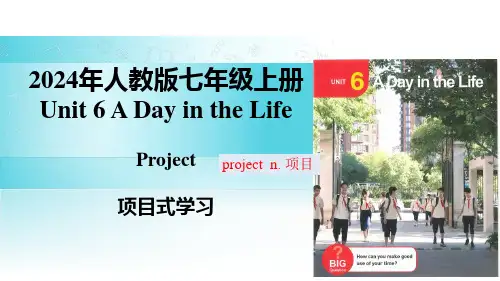
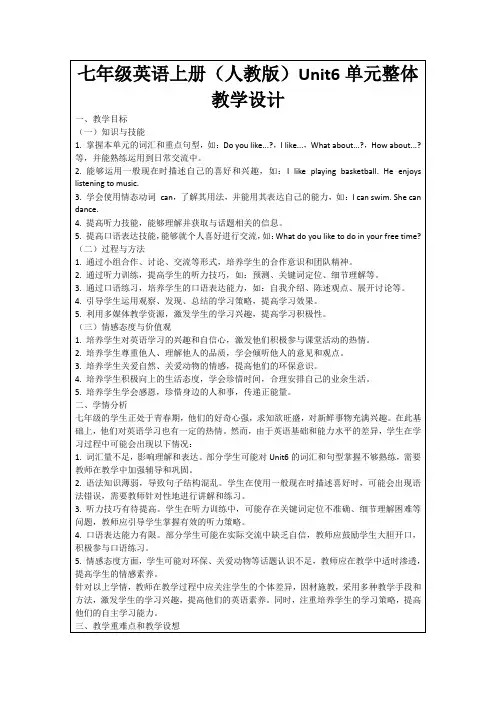
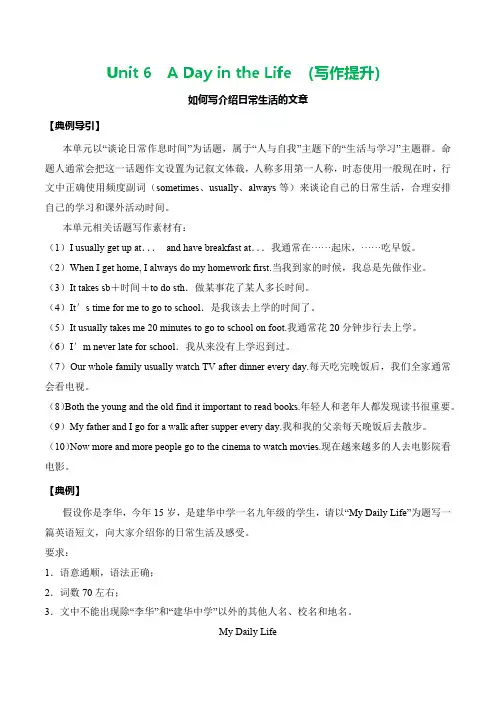
Unit 6 A Day in the Life (写作提升)如何写介绍日常生活的文章【典例导引】本单元以“谈论日常作息时间”为话题,属于“人与自我”主题下的“生活与学习”主题群。
命题人通常会把这一话题作文设置为记叙文体裁,人称多用第一人称,时态使用一般现在时,行文中正确使用频度副词(sometimes、usually、always等)来谈论自己的日常生活,合理安排自己的学习和课外活动时间。
本单元相关话题写作素材有:(1)I usually get up at...and have breakfast at...我通常在······起床,······吃早饭。
(2)When I get home, I always do my homework first.当我到家的时候,我总是先做作业。
(3)It takes sb+时间+to do sth.做某事花了某人多长时间。
(4)It's time for me to go to school.是我该去上学的时间了。
(5)It usually takes me 20 minutes to go to school on foot.我通常花20分钟步行去上学。
(6)I'm never late for school.我从来没有上学迟到过。
(7)Our whole family usually watch TV after dinner every day.每天吃完晚饭后,我们全家通常会看电视。
(8)Both the young and the old find it important to read books.年轻人和老年人都发现读书很重要。
(9)My father and I go for a walk after supper every day.我和我的父亲每天晚饭后去散步。